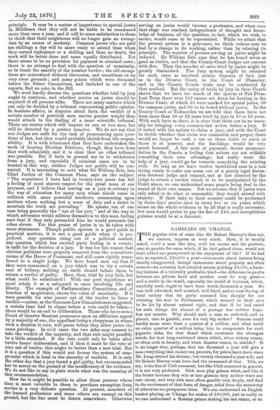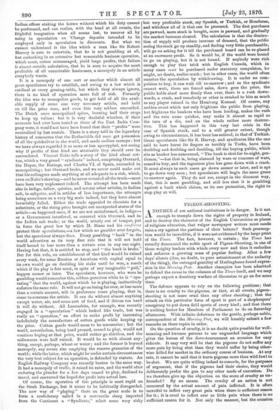GAMBLING ON 'CHANGE.
TELE popular view of cases like Sir Robert Harvey's does not, we confess, impress us very much. How, it is usually asked, could a man like him, with his means and his position, care to gamble for sums which, if he had gained them, would not have added one pennyworth to his enjoyment of life? If he had not, as reported, /30,000 a year—statements about income being usually exaggerated, though statements about property are often correct—he certainly had entailed estates yielding £8,000, a bank- ing business of a tolerably profitable kind—the difference in profits between one private bank and another must be very great— and a credit in the world, especially the world of business, which, carefully used, ought to have been worth thousands a year. He was well educated, well married, well liked, and so near the top of local society that his party censured him sharply for not claiming the seat in Parliament, which seemed in their eyes to be his by almost natural right, and that if he had cared for such things his chance of a peerage was neither hope- less nor remote. Why should such a man so endowed, and so placed, care to gamble, even for very big stakes ? Success could hardly mean more than a quarter of a million, and what could an extra quarter of a million bring him to compensate for such gigantic risks, for that dread which overturns the strongest minds, for that long-continued strain which, when victory comes, so often ends in fatuity, and when disaster comes, in suicide ? It is no longer true, perhaps, that ten thousand a year will give a man everything that money can procure, for prices have risen since Mr. Long uttered his dictum ; but twenty thousand a year will; and Sir Robert Harvey must have had the command of that. This, we say, is the line of Club comment, but like Club comment in general, it is not very profound. Rich men play guinea whist, and like it the better because they win or lose guineas they neither want nor care about, and very rich men often gamble very deeply, and find in the excitement of that form of danger, relief from the monotony of otherwise too prosperous lives. We can understand an English banker playing on 'Change for stakes of 1.80,000, just as easily as we can understand a Russian prince staking his last estate, or an
Indian officer staking the horses without which his duty cannot be performed, and can realize, with the head at all events, the frightful temptation when all seems lost, to recover all by using in speculation on 'Change deposits intended to be employed only in speculation in discounts. But what we cannot understand is the idea which a man like Sir Robert Harvey is sure to entertain, that he is not gambling at all, but embarking in an extensive but reasonable business operation, which must, unless mismanaged, yield large profits, that failure is almost outside calculation, that he is surf! to acquire the most profitable of all conceivable businesses, a monopoly in an article everybody wants.
It is a monopoly of one sort or another which almost all great speculators try to establish, and owing to a law which is cardinal at every gaming-table, but which they always ignore, there is no kind of operation more full of risk. Formerly the idea was to monopolize goods, to get hold of all the avail- able supply of some one very necessary article, and hold on till the price rose, and even this very seldom succeeded. The Dutch once monopolized spices, burning half their crops to keep up values; but it is very doubtful whether, if their accounts had ever been tested as those of the East India Com- pany were, it would not have been found that their "profits" were neutralized by lost rentals. There is a story told in the legendary history of commerce that the Rothschilds did once get possession of all the quicksilver in the world, and made endless moneys ; but we have always regarded it as more or less apocryphal, not seeing why if profits of that kind are attainable they should ever be surrendered. Vincent Nolte tells a story of the kind about cot- ton, which a very grand " syndicate " indeed, comprising Ouvrard, the Hopes, the Baring, and Charles VI. of Spain, succeeded in monopolizing ; but Ouvrard broke, and we never could make out that his colleagues made anything at all adequate to a risk, which, even on Nolte's showing—and he never revealed all the truth—must have been very unpleasant indeed. The attempt has been made also in indigo, tallow, quinine, and several other articles, in Indian salt, in saltpetre, and in articles of less importance, the attempts being sometimes on a very big scale indeed, but they have almost invariably failed. Either the trade appealed to chemists for a substitute, or the rising price brought out unexpected stores of the article—as happened once, if we are not misinformed, in indigo— or a Government interfered, as occurred with Ouvrard, and in the Indian salt trade ; or the world, utterly out of temper, put in force the great law by which M. Blanc and his confiires protect their speculations,—a law which no gambler ever forgets, but the speculator always does. Every gambling " bank " in the world advertises as its very first rule that it will not hold itself bound to lose more than a certain sum in any one night. Having lost that, it is entitled to stop, and "the bank is broke." But for this rule, an establishment of that kind would be ruined every week, for some Russian or American with capital equal to its own would go on doubling his stake until he won, a result which if the play is fair must, in spite of any imaginable "pull," happen sooner or later. The speculator, however, who were he gambling would remember this, seldom perceives while he is " ope- rating " that the world, against which he is playing, instinctively enforces the same rule. It will not go on losing for ever, or lose more than a certain amount, will in preference cease playing, that is, cease to consume the article. It can do without almost anything except water, air, and some sort of food, and if driven too hard it will do without. All Lancashire, for example, was recently engaged in a " speculation " which looked like trade, but was really an "operation," an effort to make profit by increasing indefinitely the manufacture of cotton goods while keeping up the price. Cotton goods would seem to be necessaries ; but the world, nevertheless, being hard pressed, ceased to play, would not continue buying at that price, would rather go shirtless, and the millowners were half ruined. It would be so with almost any- thing, except, perhaps, wheat or water ; and the former is beyond monopoly, any severe rise emptying the reserve granaries of the world ; while the latter, which might be under certain circumstances the very best subject for an operation, is defended by statute. An English Railway Company was recently beaten in the same way. It had a monopoly of traffic, it raised its rates, and the world after enduring the plunder for a few days ceased to play, declined to travel, and converted the hoped-for profit into actual loss.
Of course, the operation of this principle is most rapid on the Stock Exchange, but it seems to be habitually disregarded. The new way of " playing " there on the great scale is to form a confederacy called in a mercantile slang imported from the Continent a "Syndicate," select some very risky
but very profitable stock, say Spanish, or Turkish, or Honduras, and withdraw all of it that can be procured. The first purchases are pawned, more stock is bought, more is pawned, and gradually the market becomes cleared. The calculation is that the diminu- tion of supply will produce increase of demand, that the public seeing the stock go up steadily, and finding very little purchasable, will go on asking for it till the purchased hoard can be re-placed at an enormous profit. So it would be, if the world were bound to go on playing, but it is not bound. If anybody were rich enough to play that trick with English Consols, which in many cases must be purchased under statutory compulsion, he might, no doubt, realize much ; but in other cases, the world often smashes the speculation by withdrawing. It is under no com- pulsion to buy, it can wait till to-morrow ; and as the syndicate cannot wait, there are forced sales, down goes the price, the public holds aloof more firmly than ever, there is a rush down- wards, a crash, and somebody or other is °rushed to bits as much as any player ruined in the Homburg Kursaal. Of coarse, any sudden event which not only frightens the public from playing, but frightens the bankers who have been lending, makes the rush and the ruin come quicker, may make it almost as rapid as the turn of a die, and on the whole rather more destruc- tive. This has happened in this very last crisis in the case of Spanish stock, and to a still greater extent, though owing to circumstances, it has been less noticed, in that of Turkish. Great speculators like Sir R. Harvey, and syndicates like the one said to have burnt its fingers so terribly in Turks, have been doubling and doubling and doubling, till the buying public, which sits as banker has announced, "The bank is shut for to-night, gen- tlemen,"—has that is, being alarmed by wars or rumours of wars, ceased to buy, and the ingenious plan has gone down with a crash. It must always in such cases go down sooner or later, and is apt to go down very soon ; but speculators will begin the same game to-morrow again. They do not see, except in the dimmest way, that, this is mere gambling, and still less that it is gambling against a bank which claims, as its one protection, the right to stop play at will.































 Previous page
Previous page